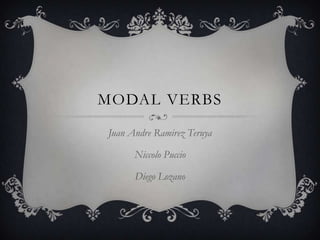
Modal verbs
- 1. MODAL VERBS Juan Andre Ramirez Teruya Niccolo Puccio Diego Lozano
- 2. WHAT ARE THEY? Verbs that don’t follow the same grammatical rules as others verbs and that can also be used to express obligation, permission, willingness, pos sibility, etc.
- 3. WHICH ARE THEY? Can Could May Might Shall Should Will Would Must Ought to Need to Have to Be able to
- 4. HOW DIFFERENT ARE THEY? These verbs dont use “-s” in the third person present simple. He cans do it. INCORRECT He can do it. CORRECT
- 5. HOW DIFFERENT ARE THEY? They dont need “do” or “does” to form a negative verb (Except “have to”). I don´t will go to sleep yet. INCORRECT I won´t go to sleep yet. CORRECT
- 6. HOW DIFFERENT ARE THEY? Some of them can´t be used in the future tense or past tense. Instead, we use other words for similar meanings. I will can go to the reunion. INCORRECT I will be able to go to the reunion. CORRECT I musted study more. INCORRECT I had to study more. CORRECT
- 7. HOW DIFFERENT ARE THEY? They don´t use “to” in the infinitive (Except “need to”, “have to” “ought to”…) To may. INCORRECT To should. INCORRECT
- 8. TO EXPRESS ABILITY “Be able to”, “can” and “could”. I can go for a ride. He could do a banana split. We were able to prepare a meal by ourselves.
- 9. TO EXPRESS PERMISSION “Can” and “could”. “Could” is used for the past in these cases. I can leave the school is I wish. They couldn´t stay at home yesterday.
- 10. TO EXPRESS OBLIGATION “Must”, “need to” and “have to” I must clean my room every weekend. She needs to take a break, now. You have to focus or you will fail.
- 11. TO EXPRESS POSSIBILITY “May”, “might”, “could”, “should”, “ought to” and “would”. Our project may be approved. I ought to eat more healthy food. This could be one of my best works.
- 12. THAT´S ALL FOR MODAL VERBS!